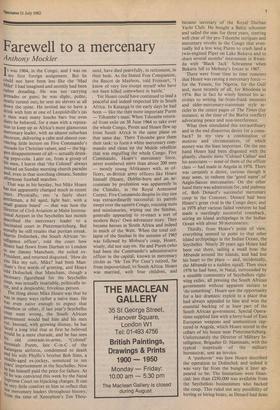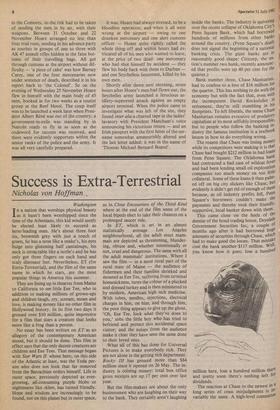Farewell to a mercenary
Anthony Mockler
It was 1964, in the Congo, and I was on my first foreign assignment. But he could not have been less like the 'Mad Mike' I had imagined and secretly had been rather dreading. He was not carrying grenades or guns; he was slight, polite, neatly turned out;. he sent no shivers at all down the spine. He invited me to have a drink with him at one of Leopoldville's (as it then was) many louche bars but even there he behaved, for a man with a reputa- tion to keep up as Africa's most glamorous Mercenary leader, with an almost suburban decorum, delivering a calm and almost con- vincing little lecture on Five Commando's crusade for Christian values, and — the big- gest disappointment of all — actually drink- ing pepsi-cola. Later on, from a group of his men, I learnt that 'the Colonel' always insisted on Sunday morning church parades and, even in that scorching climate, Sunday afternoon football matches.
That was in his heyday, but Mike Hoare has not apparently changed much in recent Years. Physically, yes: 'a fairly short gentleman, a bit aged, light hair, with a striall goatee beard' — that was how the 1). 'rector of Civil Aviation at Mahe Interna- tional Airport in the Seychelles last month described the mercenary leader to a fascinated court in Pietermaritzburg. But Morally he still retains that puritan streak. Martin Dolinchek, the South African 'in- t,selligence officer', told the court how Hoare had flown from Durban to London to see Jimmy Mancham, the exiled ex- President, and returned disgusted. 'How do You like my suit, Mike? had been Man- eham's first words of greeting, and Hoare told Dolinchek that Mancham, though a necessary figurehead for the Seychelles c°uP, was sexually insatiable, politically in- ept, and a despicable, frivolous person. The thing about Mike Hoare was that he was in many ways rather a naive man. He Was even naive enough to expect that somehow or other, if last year's Seychelles c°1113 went wrong, the South African government would bail him and his men out. Instead, with growing dismay, he has faced a long trial that at first he believed WL.ould be a mere charade, and he has seen ?is old comrade-in-arms, 'Colonel' 'I„,eremiah Puren, late C-in-C of the tangese airforce, condemned to death and his wife Phyllis's brother Bob Sims, a Middle-aged ex-jockey, sentenced to ten 'ears' imprisonment in the Seychelles. Now ne has himself paid the price for failure. At he was convicted this week by the Natal Lillpreme Court on hijacking charges. It can f°e very little comfort to him to reflect that feW mercenary leaders throughout history, rein the time of Xenophon's Ten Thou-
sand, have died peacefully, in retirement, in their beds. As the famed Free Companion, the Bascot de Mauleon, told Froissart, 'I know of very few except myself who have not been killed somewhere in battle.'
Yet Hoare could have continued to lead a peaceful and indeed respected life in South Africa. In Katanga in the early days he had been — like the then more important Puren — Tshombe's man. When Tshombe return- ed from exile on 30 June 1964 to take over the whole Congo, Puren and Hoare flew up from South Africa in the same plane on that same day. There Tshombe gave them their task: to form a white mercenary com- mando and clean up the Mulele rebellion that was engulfing the whole Congo. Five Commando, Hoare's mercenary force, never numbered more than about 200 men
— mostly young Afrikaners with, as of- ficers, ex-British army officers like Hoare himself (Hoare, Dublin-born and an ac- countant by profession was apparently in the Chindits, in the Royal Armoured Corps). Five Commando despite its tiny size was extraordinarily successful: its patrols swept over the eastern Congo, rescuing nuns and missionaries, wiping out the Simbas, generally appearing to re-enact a sort of modern Boys' Own adventure story. They became heroes in South Africa and indeed in much of the West. When the total col- lapse of the Simbas in the autumn of 1965 was followed by Mobutu's coup, Hoare, wisely, did not stay on. He and Puren (who had been the Commando's administrative officer in the capital, known in mercenary circles as `Mr Ten Per Cent') retired, far from impoverished, to South Africa. Hoare was married, with four children, and
became secretary of the Royal Durban Yacht Club. He bought a Baltic schooner and sailed the seas for three years, steering well clear of the pro-Tshombe intrigues and mercenary revolts in the Congo that even- tually led a less wise Puren to crash land a twin-engined Piper on Lake Bukavu and to share several months' internment in Rwan- da with 'Black Jack' Schramme when Bukavu fell to Mobutu's forces in 1967.
There were from time to time rumours that Hoare was raising a mercenary force — for the Yemen, for Nigeria, for the Gulf and, most recently of all, for Rhodesia in 1974. But in fact he wisely limited his ac- tivities to writing far-from-frank memoirs and elder-mercenary-statesman style ar- ticles in the centre pages of The Times (for instance, at the time of the Biafra conflict) advocating peace and non-interference.
What then stimulated this extraordinary and in the end disastrous desire for a come- back? In my view a combination of motives and circumstances, of which money was the least important. On the one hand Hoare had been disgusted with the ghastly, chaotic mess 'Colonel Callan' and his associates — none of them of the officer class — had made in Angola in 1976. There was certainly a desire, curious though it may seem, to redeem the 'good name' of Anglo-Saxon mercenaries. On the other hand there was admiration for, and jealousy of, Bob Denard's successful mercenary coup in the Comores. Denard had been Hoare's great rival in the Congo days; and in 1978 after various failed ventures he had made a startlingly successful comeback, seizing an island archipelago in the Indian Ocean with about 50 mercenaries.
Thirdly, from Hoare's point of view, everything seemed to point to that other island archipelago in the Indian Ocean, the Seychelles. Nearly 20 years ago Hoare had been out there, sailing a small boat the Miranda around the islands, and had lost his heart to the place — and, incidentally, the Miranda to a sudden squall. Then since 1976 he had been, in Natal, surrounded by a sizeable community of Seychellois right- wing exiles, all pressing the South African government without apparent success to 'do something'. Hoare saw the opportunity for a last dramatic exploit in a place that had always appealed to him and won the essential backing of at least part of the South African government. Special Opera- tions supplied him with a lorry-load of East European weapons and ammunition cap- tured in Angola, which Hoare stored in the cellars of his house near Pietermaritzburg. Unfortunately the Director of Military In- telligence, Brigadier D. Hammam, with the typical ineptitude of the military bureaucrat, sent an invoice.
A 'pushover' was how Hoare described the operation to Dolinchek and indeed it was very far from the bungle it later ap- peared to be. The limitations were finan- cial: less than £250,000 was available from the Seychellois businessmen who backed the coup. This ruled out any possibility of buying or hiring boats, as Denard had done in the Comores, so the risk had to be taken of sending the men in by air, with their weapons. Between 31 October and 22 November Hoare arranged no less than four trial runs, sending in his advance party as tourists in groups of one to three with AK 47 assault rifles hidden in the false bot- toms of their travelling bags. All got through customs at the airport without dif- ficulty — 'a piece of cake' was how Barney Carey, one of the four mercenaries now under sentence of death, described it in his report back to 'the Colonel'. So on the evening of Wednesday 25 November Hoare flew in himself with the main body of 45 men, booked in for two weeks as a tourist group at the Reef Hotel. The coup itself was to be launched a week later when Presi- dent Albert Rene was out of the country; a government-in-exile was standing by in Nairobi ready to fly in as soon as the codeword for success was received, and there were evidently supporters within the senior ranks of the police and the army. It was all very carefully prepared. It was, Hoare had always stressed, to be a bloodless operation; and when it all went wrong at the airport — owing to one drunken mercenary and one alert customs officer — Hoare quite rightly called the whole thing off and within hours had ex- tricated all of his men who wanted to leave, at the price of two dead: one mercenary who had shot himself by accident — they flew his body back with them to Durban — and one Seychellois lieutenant, killed by his own men.
Shortly after dawn next morning, seven hours after Hoare's men had flown out, the Seychelles army launched a ferocious ar- tillery-supported attack against an empty airport terminal. When the police came to investigate what was left of the site, they found inter alia a charred tape in the ladies' lavatory with President Mancham's voice announcing his victorious return — and an Irish passport with the first letter of the sur- name somewhat amateurishly altered and the last letter added: it was in the name of 'Thomas Michael Bernard Boarel'.







































 Previous page
Previous page